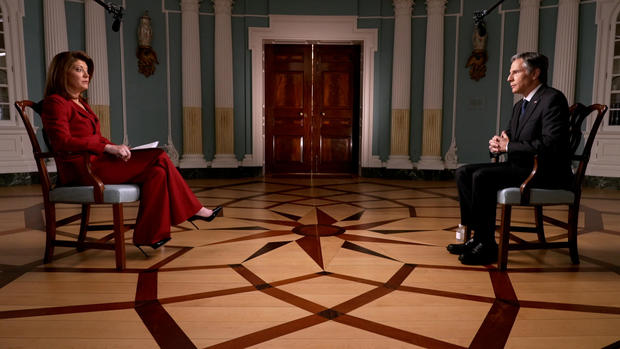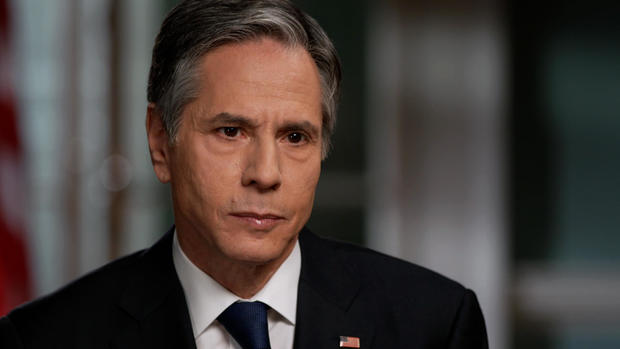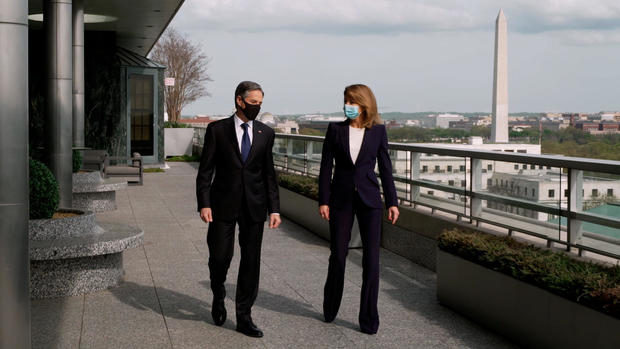O próprío título da matéria – "ameaça chinesa" – e as palavras dos interlocutores – "atitude belicosa da China" – refletem a postura confrontacionista dos EUA vis-a-vis a China.
Temas que deveriam ser resolvidos no plano multilateral – postura maliciosa da China no sistema multilateral de comércio, roubo de propriedade intelectual – estão sendo pressionados pela via bilateral. Não vai dar certo, assim como não vai dar certo os EUA se meterem nos assuntos internos da China. PRA
Secretary of State Antony Blinken on the threat posed by China
Norah O'Donnell speaks with Secretary Blinken in a wide-ranging interview that touches on China's recent military aggression, winding down the long war in Afghanistan and the immigration crisis at the U.S.-Mexico border.
In his first 100 days, President Biden focused on the coronavirus pandemic, but over the course of his term, the Biden presidency will be defined by how the United States competes with China. In a few years, China's economy is expected to surpass the U.S. as the world's biggest.
To determine how the United States will deal with China's growing influence, Mr. Biden has chosen one of his closest aides as secretary of state. It falls to Antony Blinken to rebuild a depleted and demoralized State Department, repair U.S. alliances and champion what diplomats call "the rules-based international order" -- the written and unwritten code that governs how nations deal with one another. Rules that, he says, are now threatened by China.
Antony Blinken: It is the one country in the world that has the military, economic, diplomatic capacity to undermine or challenge the rules-based order that we-- we care so much about and are determined to defend. But I want to be very clear about something. And this is important. Our purpose is not to contain China, to hold it back, to keep it down. It is to uphold this rules-based order that China is posing a challenge to. Anyone who poses a challenge to that order, we're going to stand up and-- and defend it.
Norah O'Donnell: I know you say the goal is not to contain China, but have you ever seen China be so assertive or aggressive militarily?
Antony Blinken: No, we haven't. I think what we-- what we've witnessed over the last-- several years is China acting more repressively at home and more aggressively abroad. That is a fact.
Norah O'Donnell: What's China's goal?
Antony Blinken: I think that over time, China believes that it-- it-- it can be and should be and will be the dominant-- country in the world.
This past week, China's President Xi unveiled three new warships to patrol the South China Sea.
It already has the world's largest Navy - and could use it to invade Taiwan, a democratic island and long-standing U.S. ally.
Norah O'Donnell: Do you think we're heading towards some sort of military confrontation with China?
Antony Blinken: I think it's profoundly against the interests of both China and the United States-- to-- to get to that point, or even to head in that direction.
Norah O'Donnell: Let's talk about human rights. Describe what you see is happening in Xinjiang that maybe the rest of the world doesn't.
Antony Blinken: We've made clear that we see a genocide having taken place against the Uyghurs in Xinjiang. More than a million people have been put into, choose your term, concentration camps, reeducation camps, internment camps. When Beijing says, "Oh, there's a terrorism threat," which we don't see. It's not coming from a million people.
Six weeks ago in Alaska, Secretary Blinken confronted Yang Jiechi, China's top diplomat, about genocide in Xinjiang and China's military aggression.
Blinken to Jiechi: We feel an obligation to raise these issues here today.
The exchange became an international incident caught on camera and not lost in translation.
Jiechi through translator: The United States does not have the qualification to say that it wants to speak to China from a position of strength.
Norah O'Donnell: If Xinjiang isn't a red line with China, then what is?
Antony Blinken: Look, we don't have-- the luxury of not dealing with China. There are real complexities to the relationship, whether it's the adversarial piece, whether it's the competitive piece, whether it's the cooperative piece.
Even before the meeting in Alaska, President Xi had warned about the dawn of a new cold war. During President Trump's time in office, China found the U.S. less predictable than past administrations.
President Trump: And I just announced another 10% tariff.
Mr. Trump imposed tariffs on hundreds of billions of dollars of Chinese products in response to what he called unfair trade practices -- and the theft of U.S. intellectual property. So far, the Biden administration has kept the tariffs in place.
President Biden: I also told President Xi that we'll maintain a strong military presence.
China may be the only big issue of the day in Washington in which Democrats and Republicans find common cause.
Norah O'Donnell: The Chinese have stolen hundreds of billions, if not trillions, of dollars of trade secrets and intellectual property from the United States. That sounds like the actions of an enemy.
Antony Blinken: Certainly sounds like the actions of-- of-- of someone who's trying to compete unfairly-- and increasingly in adversarial ways. But we're much more effective and stronger when we're bringing like-minded and similarly aggrieved countries together to say to-- Beijing, "This can't stand, and it won't stand."
Norah O'Donnell: So is that a message that President Biden has delivered to President Xi?
Antony Blinken: Certainly in their-- in their first conversation-- they covered a lot of ground.
Norah O'Donnell: It was a, reportedly, a two-hour phone call?
Antony Blinken: It was. Yeah, I was there.
Norah O'Donnell: And so did President Biden tell President Xi to cut it out?
Antony Blinken: President Biden made clear-- that in a number of-- areas we have-- real concerns about the actions that--China has taken, and that includes in the economic area, and that includes-- the theft of intellectual property.
Norah O'Donnell: China's gross domestic product is expected to surpass the United States as early as 2028.
Antony Blinken: Well, it's a large country, it's got a lotta people.
Norah O'Donnell: If China becomes the wealthiest country in the world, doesn't that also make it the most powerful?
Antony Blinken: A lot depends on how it uses that wealth. It has an aging population. It has significant environmental problems. And so on. But here's the way I think about it, Norah, writ large, if we're talking about what really makes the wealth of a nation, fundamentally it's its human resources and the ability of any one country to maximize their potential. That's the challenge for us, it's the challenge for China. I think we're in a much better place to maximize that-- that human potential than any country on Earth, if we're smart about it.
Norah O'Donnell: China thinks long-term, strategically, decades in advance. Is America just caught up on the latest fires here and there? And we are not thinking long-term, strategically? And, as a result, China will surpass us?
Antony Blinken: What I've found looking at our own history, is that when we've confronted a significant challenge, significant competition-- significant adversity, we've managed to come together and actually do the long-term thinking, the long-term investment. And that is really the moment we're in now, and that's the test that I think we're facing. Are we actually going to rise to it? I-- President Biden believes we are.
Antony Blinken occupies a suite of offices on the 7th floor of the State Department, but he first worked for Joe Biden at the Senate Foreign Relations Committee nearly 20 years ago and has barely left his side since. In the Obama White House, Secretary Blinken held concurrent roles as an assistant to the president and the national security advisor for Vice President Biden.
Antony Blinken: It's been the most consequential professional relationship, and-- and also in many ways, personal relationship that I've-- that I've had.
Norah O'Donnell: How often do you speak?
Antony Blinken: It's pretty close to daily.
Norah O'Donnell: You speak to him every day?
Antony Blinken: In one way or another. We're pretty good at meetings. (LAUGH) So there are a few of those.
Norah O'Donnell: When I thought about the relationship that you have had with-- with President Biden over the years in the Senate and then when he was vice president, the only relationship that I could come up with, though I'm not a historian, was, of course, Secretary Baker and President George H.W. Bush.
Antony Blinken: I'd be flattered by any comparison to Secretary Baker. I actually-- I spoke to him on the phone a few months ago. And we talked about the importance of-- ideally, of secretary of state having a close relationship with-- with the president. He was extraordinarily effective for all sorts of reasons. But that was, I think, a source of-- of his effectiveness.
Secretary of State James Baker helped President George H.W. Bush end the Cold War with the Soviet Union. The current secretary is in the midst of winding down America's longest war, in Afghanistan.
Norah O'Donnell: Are you prepared for a worst case scenario in Afghanistan, where the U.S. -backed government fails, and the Taliban takes over?
Antony Blinken: We have to be prepared for every scenario, and there-- there are a range of them. And-- we-- we-- we're looking at this-- in a very clear-eyed way. But Norah, we've been engaged in Afghanistan for 20 years, and we sometimes forget why we went there in the first place, and that was to deal with the people who attacked us on 9/11. And we did. Just because our troops are coming home doesn't mean we're leaving. We're not. Our embassy's staying, the support that we're giving to Afghanistan when it comes to-- economic support, development, humanitarian, that-- that remains. And not only from us, from partners and allies.
Norah O'Donnell: Somewhat related. Will the Biden administration close Guantanamo Bay?
Antony Blinken: We believe that it should be, that's certainly a goal, but it's something that we'll bring some focus to in the months ahead.
In this past Wednesday's address to Congress, President Biden spoke about his plans for immigration reform.
President Biden: For more than 30 years, politicians have talked about immigration reform and we've done nothing about it. It's time to fix it.
It's a subject not usually central to the State Department's mission. But we asked Secretary Blinken about it because of the refugee crisis on America's southern border.
Norah O'Donnell: Border crossings for undocumented immigrants have skyrocketed. In March, more than 170,000 people were taken into custody. That's the highest in 20 years. Are the policies of the Biden administration to blame?
Antony Blinken: No. What we're seeing is indeed-- a surge of people to the border. We've seen that-- in the past. But we inherited a totally broken system. Broken intentionally. And it takes time to fix it, and by the way, our message is very clear, "Don't come. The border is not open. You won't get in." But we have to understand what is motivating so many people to do this. And it is usually desperation.
Norah O'Donnell: (AFFIRM). But that's not new. I want to talk about the policies of the Biden administration, because President Biden did use his executive authority to curb deportation, to allow more asylum seekers to enter the United States. So are these new policies by the administration contributing to this surge?
Antony Blinken: We're focused when it comes to people coming in to making sure that-- that children-- unaccompanied minors are treated humanely and according to the law.
Norah O'Donnell: Is it problematic to tell migrants, "Well, no you can't come here," and then at the same time create a different situation on the ground that does allow them to come?
Antony Blinken: But-- but the point is that they're not. One-- one of the challenges that-- that we've had is that-- traffickers and others are trying to tell them that "the border's open." It's not.
Norah O'Donnell: But children are being allowed in, and then they're being--
Antony Blinken: Children are the one exception, because we-- we will not, it-- it is the-- it is the right thing to do. We are not going to abide the notion that children are kept in a precarious, dangerous situation. That is unacceptable.
Blinken himself is a father of two young children and hails from a family that only a few generations ago were themselves refugees. His paternal great grandfather, Meir Blinkin, emigrated to New York City from Ukraine, fleeing Russian oppression in 1904.
This coming week, the secretary of state will visit Ukraine to show support for the country currently in the throes of more recent Russian aggression
Norah O'Donnell: President Putin has amassed a very large force at the border with Ukraine, more than 100,000 troops. What is Putin up to?
Antony Blinken: (LAUGH) You're right. There are-- more forces amassed on the border with Ukraine than any time since 2014, when Russia actually invaded. I can't tell you that we know-- Mr. Putin's intentions. There are any number of things that he could do or-- or-- or choose not to do. What we have seen in-- the last few days is apparently a decision to pull back some of those forces and we've seen some of them in fact start to pull back.
Norah O'Donnell: That's been verified that they are pulling back?
Antony Blinken: Starting now. We're watching that very, very carefully.
Produced by Keith Sharman. Associate producer, Kate Morris. Broadcast associates, Elizabeth Germino and Olivia Rinaldi. Edited by Michael Mongulla.






Nenhum comentário:
Postar um comentário